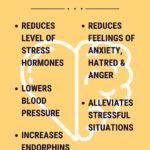He Who Laughs Lasts: 10 Profound Health Benefits of Laughter
Is Laughter Really the Best Medicine?
Let’s be honest, becoming a mom looked a lot different than I expected. I love each one of my children, but I have struggled with bouts of depression and anxiety throughout the whole experience. At those times when I was really low and things seemed bleak, being married to a humorous person and the benefits of laughter really pulled me through some dark times. Don’t get me wrong, some of his dad jokes are hardly laughable, but even the smile and rolling of eyes, as I shake my head has brought me out of some pretty dark places.
So I’ve been curious, can a focus on humor really help us feel better? Is it just in our heads or do laughter and humor really help improve our mood and health?
The use of laughter as therapy
Laughter or Humor Therapy is a type of therapy that uses laughter to help alleviate pain and stress and improve a sense of one’s well-being. Variations of laughter therapy aren’t new, but a new focus on this inexpensive and very accessible form of healing is being brought to the light yet again. With depression rates in the United States nearly tripling in 2020 (thank you Rona), and continuing to climb according to this Boston University article, this is more relevant than ever.
Oh and let's not forget the millions affected by chronic diseases! It's no wonder that people are seeking out more natural and simple ways to improve their health. To quote Cristina Lorefice, a Laughter Yoga Coach,
“Depression comes from being stuck in the past, anxiety- from being worried about the future, and laughter helps us be present and focused on the moment."
When it comes to healing from surgeries, coping with chronic pain, or just overcoming bouts or even severe struggles of depression, we are discovering that laughter has both mental and physical benefits. It’s not just in our head, pun intended!
History of Laughter in Medicine
Where did the phrase, “laughter is the best medicine” come from? It’s hard to say, but many people reference the Proverb in the Bible that says, “A merry heart doeth good like a medicine…” It's easy to see that the concept of humor improving our health has lasted for centuries. Even Shakespeare referred to the health benefits of laughter in his play, The Taming of the Shrew:
“Your honour's players, hearing your amendment,
Are come to play a pleasant comedy,
For so your doctors hold it very meet,
Seeing too much sadness hath congealed your blood,
And melancholy is the nurse of frenzy.
Therefore they thought it good you hear a play,
And frame your mind to mirth and merriment,
Which bars a thousand harms and lengthens life.”

A Dr. Miletus of the 4th century highlighted that the word “laughter” in Greek is “gélio”. The root word for gélio is “hele” which means “health”. So to him, laughter and health go hand in hand. In the 1300s, a French surgeon named Henri de Mondeville felt that his patients who felt hopeful about their outcomes would have better recoveries. He pushed to have his patients' recoveries filled with happiness, laughter, and hope from music and jokes shared by friends and family. There are even claims that Mondeville considered providing his patients with forged letters of the death of their enemies, just to cheer them up! Oh my!
Research on Laughter and Health
More recently, in the 1960-70s, an American Journalist, Norman Cousins, having suffered some significant health issues himself, publicized the idea of laughter healing the body. He wrote the book “Anatomy of an Illness as Perceived by the Patient”. In coping with the pain he had from various illnesses, he was well known for helping to heal himself through laughter. And, thanks to his personal research, he was invited to participate in creating more research to really discover the effect laughter and humor have on our health. Cousins’ personal research has inspired hundreds of those involved in various forms of laughter therapy today.
Although more current research can distinguish quantifiable positive physiologic effects from laughter, the research is small and not fully corroborated yet. That being said, there is a ton of more anecdotal experiences, and because laughter as a form of therapy is so affordable and virtually risk free, researchers continue to investigate how and why it works.
Laughter and its Not-So-Laughable Benefits
As stated already, one of the best benefits of Laughter Therapy is that the techniques are free and easily applicable. What a great chance to improve the world in such a small and seen as an insignificant way.
What researcher JongEun Yim discovered about the physical & mental benefits of laughter, is far from insignificant though. He reviewed much of the research that has been put into laughter therapy in the last decade (“Therapeutic Benefits of Laughter in Mental Health”) and a summary of his review includes the following benefits:
Physical Benefits:
- Reduces the level of stress hormones
- Reduces blood pressure
- Increases endorphins
- Increases immunity
- Positively impacts heart function
Mental Benefits:
- Reduces negative feelings like anxiety, tension, hatred and anger
- Alleviates stressful situations
- Mitigates symptoms of depression
- Reduces memory failure
- Can even improve insomnia
So all these wonderful benefits sound great, but can someone obtain them just from watching their favorite comedy or does it take a certain regimen to truly reap the benefits of laughter? Does it matter if it’s forced or does it have to come naturally?
How do you do Laughter Therapy?
Before answering those questions, let's understand the different types of Laughter Therapy. Generic Laughter Therapy can be anything that brings joy and humor to the individual. Often in hospitals, you will see carts carrying things to entertain and enlighten the patient's moods. This is a form of Laughter Therapy. Watching a comedy movie and laughing with loved ones is also a form of Laughter Therapy. It can also come in the form of working with a therapist who specializes in Laughter Therapy. To find a laughter therapist or laughter yoga practice near you, just search Google.
Whenever we laugh, we release endorphins, which not only help our brains feel good, it helps with pain. An article in Scientific American, talks about a study with the results of increasing pain threshold by 10% just by watching 15 minutes of comedy in a group. Social/physical/mental are all so interconnected, which helps explain why my bouts of depression, often felt more manageable with my husband's funny remarks and outlook on life.
Laughter Yoga
If you don’t have enough humorous friends around you or if you feel like you would benefit from having more laughter in your life, there is a form of Laughter Therapy called Laughter Yoga. Laughter Yoga can be in a more formal class you can attend, where you mimic laughter to promote the benefits humor has to the body.
Laughter Yoga, practiced in more than 110 countries, was developed by Dr. Madan Kataria.. In these exercises, you combine laughter exercises with yoga breathing exercises. Laughteryoga.org claims that 10-15 minutes of daily Laughter Yoga can help “reduce stress, make your immune system stronger and keep your mind positive during challenging times.” If you’re not quite ready to seek out a Laughter Yoga class, you can head to YouTube for various Laughter Yoga exercises to do in your very own home.
It’s fascinating to learn that through Laughter Yoga benefits, even faking a laugh at first can still boost one's mood and reduce stress. Many Laughter Yoga practitioners will agree that with continued practice, the beginning, more forced laughs, quickly develop into real ones that get those endorphins pumping. It becomes fun and less awkward the more you practice it.
How to Improve One's Sense of Humor
So now we can see that indeed laughter and humor benefit both our mood and health, what can we do about it? It’s not really about being the funniest person around, or even knowing the funniest person. Here are my top 5 tips to improve your sense of humor:
- Habit-stack planned laughter into a normal part of your everyday routine
- Learn to Laugh at yourself
- Give Laughter Yoga a try
- Read/watch funny stories a little each day
- Plan being around people who make you laugh
The Health Benefits of Laughter and Humor
Laughter may not be exactly like the medicine that we consume by mouth and quickly see improvements to specific ailments. I sure wish a spoonful of laughter could cure everything, but because it is affordable and easily accessible, Laughter Therapy is a great alternative to help alleviate symptoms of both physical and mental illnesses.
And, let’s be honest, we can all use more laughter and smiles to get us through the ups and downs of life. As Reba McIntire has said, “To succeed in life, you need three things: a wishbone, a backbone, and a funnybone.”
Sweet and inspiring, Britt Nelson is a wellness coach and mom of 4, devoted to helping women redefine what wellness and fitness looks like to them, in a balanced and compassionate way.
When she is not coaching or chasing after her children, you can find her spending time with close friends and family, trying new recipes with one of her brothers, or listening to music, a good book, or a podcast.
Find other articles written by Coach Britt on her coach profile. She will help you ‘tune in’ to your body, and find a balance amidst the chaos.










He who laughs……….lasts! I get it. Humor for longevity.
I don’t think I want to go a day without some sort of laughter. It makes me feel human and so down to earth.